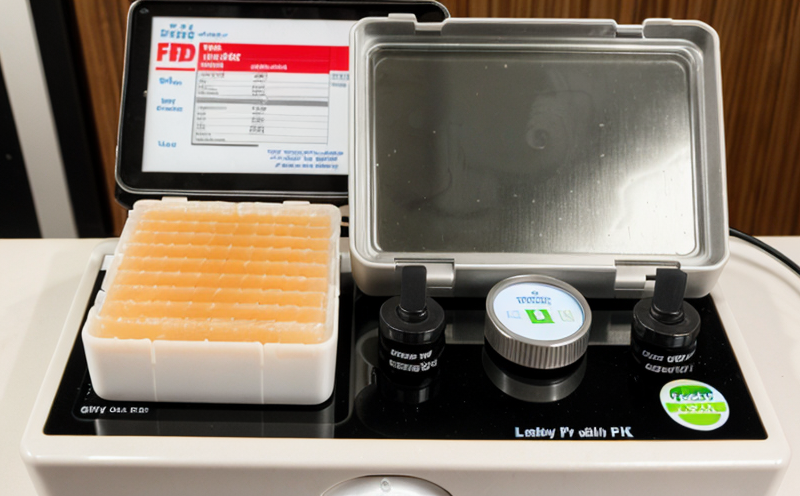ASTM D1976 Fatty Acid Analysis in Edible Oils
The ASTM D1976 standard method is widely recognized as a cornerstone for fatty acid analysis in edible oils. This test measures the individual free fatty acids present in vegetable and animal fats, which plays a critical role in ensuring food safety, quality control, and compliance with international standards.
Food products rich in lipids are subject to various changes during processing that can affect their nutritional value and shelf life. The ASTM D1976 procedure helps identify the fatty acid composition of edible oils, providing insights into the stability and freshness of these products. This knowledge is essential for quality managers and compliance officers who need to ensure product integrity across supply chains.
The analysis involves the extraction of free fatty acids from the sample using a mixture of solvents followed by titration or gas chromatography. The results provide a breakdown of the individual fatty acid components, which can help in assessing the overall quality of the oil and its suitability for consumption.
For R&D engineers, this test is crucial for optimizing production processes to enhance product quality. By understanding the specific fatty acid profiles, they can make informed decisions about ingredient selection and formulation adjustments. Procurement teams benefit from this data as it aids in sourcing high-quality raw materials that meet strict international standards.
The ASTM D1976 method is particularly important for industries such as food processing, pharmaceuticals, and cosmetics, where the presence of certain fatty acids can influence product performance and safety. This test ensures that products comply with regulatory requirements, thereby protecting consumer health and maintaining brand reputation.
- Compliance: Ensures adherence to international standards like ISO 6804-1:2003 for fatty acid analysis in edible oils.
- Precision: Provides accurate quantification of individual free fatty acids, critical for quality control and assurance.
- Consistency: Ensures that the fatty acid profile is consistent across batches and production runs.
- Traceability: Enables the tracking of product quality from raw materials to finished products.
The ASTM D1976 method also supports research into new formulations, helping developers understand how different fatty acids can influence product properties. This knowledge is vital for developing innovative products that meet consumer expectations and regulatory requirements.
Given the global nature of food production and trade, consistent testing methods like ASTM D1976 are essential to ensure uniformity in quality standards across borders. This method helps to prevent discrepancies in product specifications and ensures fair competition in international markets.
Benefits
- Quality Assurance: Ensures consistent product quality by identifying variations in fatty acid profiles.
- Regulatory Compliance: Meets international standards and ensures products are safe for consumption.
- Innovation Support: Helps researchers develop new formulations that meet consumer demand and regulatory requirements.
- Supply Chain Management: Provides insights into the quality of raw materials, aiding in supplier selection and management.
Eurolab Advantages
At Eurolab, we pride ourselves on offering unparalleled expertise in ASTM D1976 testing. Our team of highly skilled analysts uses cutting-edge equipment to ensure precision and reliability in every test. We provide comprehensive reports that are not only accurate but also actionable, helping you make informed decisions about your products.
Our commitment to quality extends beyond just the laboratory. We offer flexible service options tailored to meet your specific needs, whether you require routine testing or one-off analyses. Our international recognition ensures that our results are accepted and trusted worldwide, giving you a competitive edge in global markets.
We understand the importance of timely results and strive to deliver them quickly without compromising on accuracy. Whether you're a small business looking for quality assurance or a large corporation managing complex supply chains, Eurolab is here to support your testing needs with expertise and reliability.
International Acceptance and Recognition
The ASTM D1976 standard is internationally recognized and widely accepted by regulatory bodies across the globe. This ensures that the results from our testing are universally acknowledged, making it easier for you to comply with international standards and regulations.
Our laboratory is accredited to ISO/IEC 17025:2017, which guarantees that all tests conducted meet the highest quality standards. This accreditation also means that our results can be used in legal proceedings and regulatory submissions worldwide. Our global recognition ensures seamless integration into international supply chains and trade agreements.
By partnering with Eurolab for ASTM D1976 testing, you gain access to a network of trusted laboratories and experts who understand the importance of accurate fatty acid analysis. This collaboration helps you stay ahead of industry trends and regulatory changes, ensuring that your products remain competitive in an ever-evolving market.





